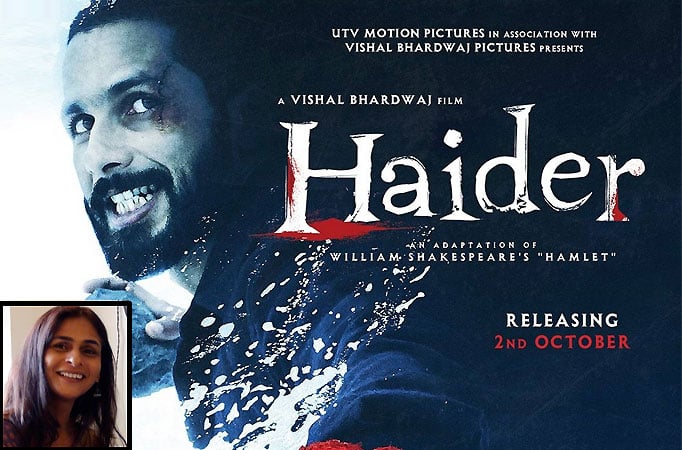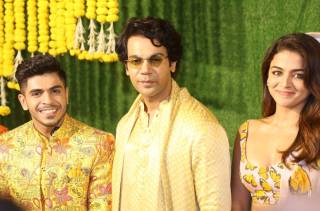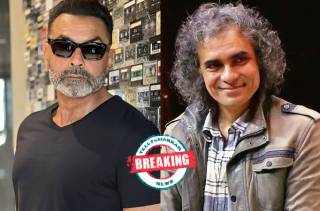Submitted by
Gayatri Gauri
on
Thu, 10/02/2014 - 12:54

‘Chutzpah’is a fascinating word.It is discussed at length by Haider (Shahid Kapoor) in one of his rare,lighter moments. This comes as a huge relief as Shakespeare’s Hamlet is otherwise a brooding,philosophical character who is forever unsure, introspective, indecisive and passive.
You can have fun,even, when telling the world’s most famous tragedy,Hamlet, seen on screen the world over, at least a dozen times. You can even be poetic in poignancy.And you can display the most bizarre humour in the most unlikely scenario.That’s the director,Vishal Bhardwaj’s ‘chutzpah’.
So when a couple of grave diggers dig a grave in Kashmir’s snow-clad graveyard,they merrily sing, “aao na,ki jaan gayi…”. They beckon death yet Bhardwaj’s music is anything but ominous. The gravediggers lie down inside and say in jest to Haider, “come dig your own grave”. A perfect icy setting for cold and naked truths about death. Here, Haider picks up a skull and renders most casually one of the most famous Hamlet scenes. You are reminded, one of the writers is Shakespeare. The other two are Bhardwaj and Basharat Peer.
Soon when a dead body is brought into a snow clad graveyard and Haider (Shahid Kapoor) enquires,the gravediggers reply,matter of fact,“hoga koimurda”. The deadpan humour changes instantly to the most painful moment when Haider sees the dead body.A sudden turn of events leads to a most pulsating, tension filled sequence.Yet again, Bhardwaj cannot resist a light moment.The gravediggers sing a line again…’aao na’..this time beckoning the enemy in a shootout.
Death is clearly, not to be feared,but mocked at.
Haider, a third in Bhardwaj’s brave adaptations of Shakespearean tragedies, after Maqbool (Macbeth) and Omkara (Othello), is probably the most mellow among the three. Both the violence and the language,as compared to the first two films,are more subdued and subtle.If the abusive hinterland lingo in Omkara or the Urdu infused dialogues in Maqbool, took centrestage in the writing, it is a marvel that there is more of poetry which flows like Kashmir’s river, Jhelum, in the third of the trilogy.
The gentle language and the deceptively mild tone of the film offset the volatile backdrop of the story: Kashmir in 1995. Haider is a student in Aligarh, born to a Kashmir based doctor who loves poetry.He comes to Kashmir in search of his father who mysteriously disappears after the army capture him. When he sees his mother, Ghazala (Tabu, Gertrude) singing and laughing with his father’s brother (Kay Kay Menon, Claudius), he sets off, tormented, alone to find his father. His childhood girlfriend, Arshia (Shraddha Kapoor, Ophelia) who keeps a diary of poems he has written to her,is his only support.However,her father
and brother oppose their liaison.
There are so many strong threads running through the basic Hamlet plot and Kashmir’s history that the weaving at times leaves a few holes.So we see Hamlet’s initial broodiness transform into a level of madness in Haider who starts looking the part with his shaved head, clownish headgear, enigmatic mannerisms and weird antics.Kashmir’s inherent issues come forth in his mad speeches. The best use of the line “to be or not to be’ is seen in a larger political context.Haider and other Kashmiris including “half widows” stand in protest against the militancy, waiting to hear about their missing relatives. The slogan cry is , “hum hai ke hum nahin”.
However, the Kashmiri issue ends up as too light a backdrop as Haider’s complicated relationship with his mother (integral to Hamlet) takes over the entire plot.While this is used brilliantly to change Hamlet’s ending,it would have been really powerful, had the message sent out finally,been built up throughout the screenplay.
Bhardwaj’s casting as usual is impeccable and each actor slips into their Kashmiri skin and most complicated minds seen on screen. Tabu reigns like a queen of cinema,a scale of emotions mapping her intense face and wrapping you into her complex and contradicting world of deceit and loyalty.There is immense sensitivity and poignancy in the way she and Shahid become a couple and a mother and son at once.The sexual tension between the two somehow easily moves into a painful,unabiding protective love of a mother and son, made most poignant in a particular telephone scene between the two.
Shahid Kapoor essays the mad and the sane Hamlet, the jealous and possessive son and vulnerable lover,with unaffected and controlled ease.Shraddha more than matches him and Tabu in their histrionics and delivers a remarkably real performance as the innocent Kashmiri girl willing to do anything for love.Her Arshia is far more winsome than Hamlet’s Ophelia.
Both Kay Kay Menon and his characterization disappoints as he is made more human than needed. Irrfan Khan as Roohdar (King Hamlet partly)is an interesting adaptation to the original and in keeping with the Kashmiri backdrop. He stays almost as invisible as ‘rooh’ or Hamlet’s ghost with his unassuming performance.A brief appearance with Tabu in the same frame is deeply reminiscent of the magnificent pair they makeon screen.
Bhardwaj’s music, Gulzar’s lyrics and Rekha Bhardwaj’s melodious voice well timed in the end, complete this timeless tragedy.
Haider is a riveting watch at best. “Main rahoon ke main nahin” will sit heavy on the heart for a while.
(The writer tries to make peace with her own filmmaking nightmares, of being a scriptwriter, actor and assisting film icons by moonlighting as a film journalist.http://gayatrigauri.blogspot.in)
Like

0
Love

0
Haha

0
Yay

0
Wow

0
Sad

0
Angry

0











Add new comment